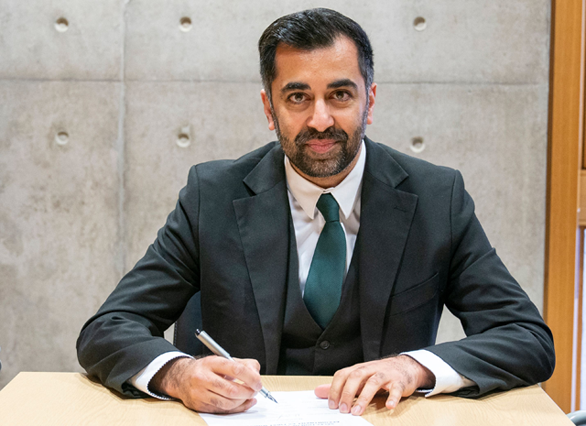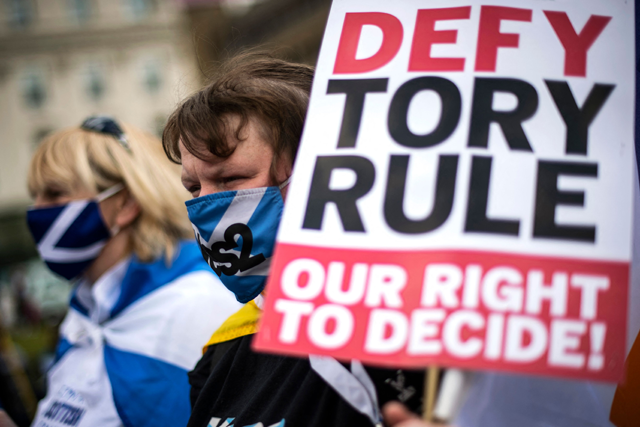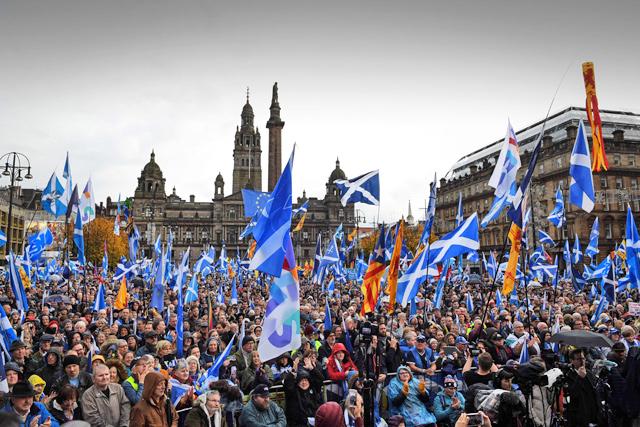You are here
Brexit and Scottish independence collide in UK vote
By AFP - Nov 27,2019 - Last updated at Nov 27,2019
BRIDGE OF ALLAN, United Kingdom — Sonja Cameron's team of canvassers has been out on the streets of Bridge of Allan twice a week since Britain's Prime Minister Boris Johnson called a general election.
Manifesto in hand, the Scottish National Party (SNP) campaigners go from door to door hoping the party's opposition to Brexit will help in their push for a new referendum on independence.
Cameron, a 55-year-old university lecturer, has taken part in SNP campaigns for three decades.
This time, it is different, she says, as volunteers pull down their hats and wrap around scarves against the freezing wind and head off through streets already decorated for Christmas.
"I think people are energised again because they feel it can really make a difference especially here in Scotland," she told AFP.
The SNP hopes to win most of the 59 Scottish seats in Britain's parliament in Westminster on December 12, which could help them secure a new vote on Scottish sovereignty.
Five years ago, 55 per cent of Scotland's 5.4 million people voted to remain in the United Kingdom with England, Wales and Northern Ireland.
"It was quite recently but a lot has changed since then," said Alyn Smith, an SNP member of the European Parliament, who is standing in the Stirling constituency in central Scotland.
The major argument against breaking up the more than three-centuries-old union in 2014 was that it would leave Scotland outside the European Union.
But the vote for Brexit in 2016 changed all that.
A majority of Scots (62 per cent) voted to remain in the bloc but are set to leave with the rest of the country by the end of January — if Johnson gets a majority next month.
Brexit has frustrated those Scots who voted to stay and reinforced a sense of alienation from decision-making hundreds of kilometres away in London.
"A lot of people are looking at independence anew. That doesn't mean they're pro-independence yet but they are coming in that direction," said Smith.
London has
the last word
A new vote on independence is by no means certain: According to polling, Scots are split almost 50-50 on the issue and London, which has to give its approval, is likely to resist.
"Most people are fed up with politics and don't want another independence referendum," said Richard Bath, editor of Scottish Field magazine.
"Scotland would be exponentially poorer if we became independent."
On the streets of Bridge of Allan, less than 3 kilometres from a statue of "Braveheart" William Wallace, Jacqueline Coyle, 58, urged the nationalists to stick to the here and now.
"I think the SNP should stop going on about leaving [the union]," she said.
"They should concentrate just now on this election and just for Brexit and forget about independence for the moment."
At the last election in 2017, the SNP saw its share of Westminster seats fall from 56 to 35.
Campaigning this time round on a slogan of "Stop Brexit", it is trying not to scare voters.
Even if it does win people over, there are other factors to consider, said political scientist Malcolm Harvey, from the University of Aberdeen.
"Unless the SNP win all 59 seats, which is very, very unlikely, or win more than 50 per cent, which is also very unlikely, the other parties will be reluctant to consider that a mandate," he added.
Hung parliament
SNP leader Nicola Sturgeon has already secured support from the devolved Scottish Parliament to ask London to trigger powers for a second referendum under section 30 of the Scotland Act 1998.
She has promised to submit the proposal before the end of this year and hold the so-called "indyref2" in 2020. But Johnson has ruled out even approving the request.
The nationalists are banking on a hung parliament where the main opposition Labour Party would need their support to form a government.
Sturgeon has said a hung parliament is "potentially the best outcome for Scotland because it gives us a significant influence and power in that scenario".
"I'm not a fan of [Labour leader] Jeremy Corbyn but we have to work with what we have before us," she said at a campaign rally in Edinburgh earlier this month.
The move is a gamble, said Harvey, recalling a warning to the SNP from Quebec nationalists in Canada that the "winning conditions" needed to be in place before moving to a vote.
"If the SNP were to lose a second referendum, you'd have to consider that this discussion was over," he said.
"The conditions currently — Scotland being dragged out of the EU against its will — certainly would be favourable but whether it would be enough to tip people into the independence camp, it's difficult to know."
Related Articles
EDINBURGH — Scotland's parliament on Tuesday confirmed Humza Yousaf will replace Nicola Sturgeon as first minister, the devolved nation's yo
LONDON — The UK supreme court will on Tuesday consider the legality of Scottish moves to hold a new referendum on independence next year wit
GLASGOW — Thousands rallied in Glasgow on Saturday calling for Scotland to become an independent country, with First Minister Nicola Sturgeo

















